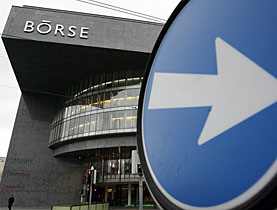Hedge fund drive causes concern

Plans to simplify regulations and taxes to attract hedge funds to Switzerland face opposition from critics who view it as another handout for the rich.
A special committee put forward proposals early in September to make Switzerland more competitive for hedge fund managers and private equity groups, arguing it would boost the country’s financial centre.
But a number of politicians and business leaders have mounted a concerted opposition to such plans and have threatened to scupper them if they reach a parliamentary vote.
Few hedge fund managers have been persuaded to come to Switzerland thanks to strong regulations that could hinder their activity and confusion over how profits and earnings would be taxed.
This was identified as an area of weakness by the Swiss banking, insurance and fund sectors last year when they presented a vision of making Switzerland one of the top three global financial centres by 2015.
A taskforce set up to tackle the problem wants globally competitive tax rates, typically 15-20 per cent, for hedge funds and private equity firms and an end to the so-called “Swiss finish” regulations that impose more red tape than international standards demand.
Hedge fund attack
Politicians from the centre-left Social Democratic Party have been swift to object to what they see as yet more perks for the rich. Swiss cantons already offer tax breaks to wealthy individuals and international corporations.
Social Democrat Susanne Leutenegger Oberholzer called the proposals “misplaced” and warned they would never be approved by parliament. Her colleague, Simonetta Sommaruga, said such a move would be “an affront to families” that are waiting for new tax benefits.
Otto Ineichen, from the business-friendly centre-right Radical Party, said it was sending out the wrong signal to reward institutions which he blamed for the recent global economic crisis. “Hedge funds damage our economy with their speculation,” he said.
Respected business leader Nicolas G. Hayek, chairman of the Swatch group, also laid into hedge funds and private equity groups during a recent speech that accused them of stifling innovation with their greed.
Outlining the benefits
But the Swiss financial community believes that luring hedge funds to Switzerland would add SFr7.6 billion ($6.6 billion) to the nation’s gross domestic product, generate 2,000 jobs and inject some SFr450 million in taxes in eight years.
Matthäus Den Otter of the Swiss Funds Association told swissinfo that proposals only went as far as clarifying existing tax laws, not creating new ones.
“Hedge fund managers will receive no special privileges, they will be subject to the same rules that apply to anyone setting up a business in Switzerland,” he said. “There will be no need to go to parliament because there will be no changes to the current regulations.”
He added that everyone stood to gain from hedge fund managers and private equity firms relocating to the country.
“Hedge fund managers pay a lot of direct and indirect taxes and AHV [social security] contributions. The question is: do we leave this to other jurisdictions or do we want to have a slice of the cake?”
swissinfo, Matthew Allen in Zurich
Last year, the Swiss Federal Banking Commission (SFBC) estimated that only four of 9,500 single hedge funds resided in Switzerland.
Switzerland enjoys less than one per cent of the $1,400 billion (SFr1,600 billion) of wealth that these hedge funds generate, the SFBC concluded.
In May 2008 changes to British tax laws made it less attractive for hedge fund managers to run their operations from there. One such fund, Krom River, recently said it would move from London to Zug for tax reasons.
However, the Swiss tax system is unclear about whether performance-related compensation for hedge fund managers, who contribute their own money to the fund, count as income or capital gains – which carry different tax burdens.
Switzerland has become even more attractive to foreign companies in the last year after lowering corporate tax rates further, according to a report from professional services firm KPMG.
The median rate of tax on company profits in the 26 cantons fell from 20.6% in 2007 to 19.2% this year. This is better than the average rate of 25.9% of the 106 countries surveyed.
The cantons of Obwalden and Appenzell Outer Rhodes had the lowest Swiss rates of 12.66%.
Montenegro leads the way in Europe with corporate tax rates of 9%, with many other countries in the east of the continent offering low rates to companies.
For the first time since 1994, none of the countries surveyed raised its corporate tax rates from the previous year.

In compliance with the JTI standards
More: SWI swissinfo.ch certified by the Journalism Trust Initiative












You can find an overview of ongoing debates with our journalists here . Please join us!
If you want to start a conversation about a topic raised in this article or want to report factual errors, email us at english@swissinfo.ch.